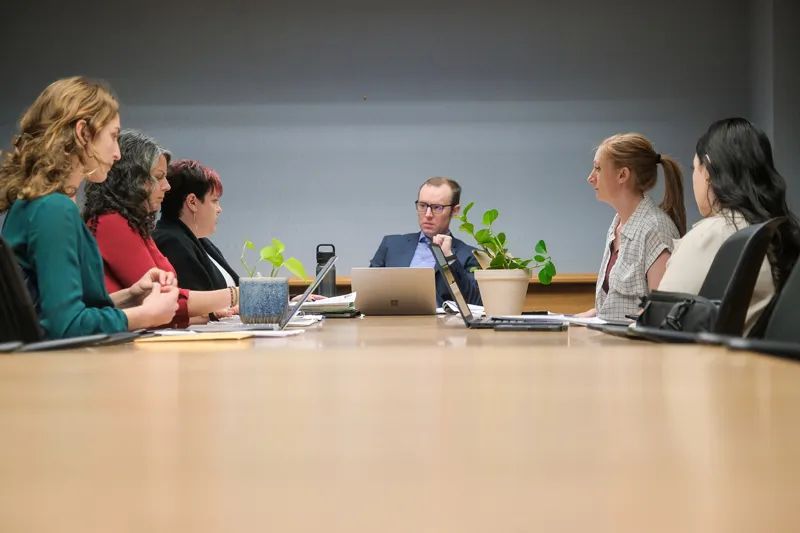
Northern Lights Family Justice Center
Offering domestic abuse survivors an array of services under one roof
Officer Katie Nash, who has been with the Billings Police Department’s Domestic Violence Unit since it was started in 2012, began hearing about Family Justice Centers after a few years on the job, mostly at national conferences she attended.
“Every time we would come back from a training,” Katie says, “myself and the city attorney’s office would have the same conversation: Wouldn’t it be nice if we had that here?”
The first Family Justice Center was established in San Diego in 2002, and there are now 150 of them in 45 states and 25 countries. The concept behind them is simple: they serve as a one-stop location where victims of family violence and abuse can get all the help they need from social service agencies, the courts, law enforcement, legal services and shelter providers.
In Billings, a turning point came a few years ago, when city leaders were making plans to create a new City Hall in another downtown building. Katie was talking with City Attorney Gina Dahl about the possibility of opening a Family Justice Center in the new building when City Administrator Chris Kukulski happened by. “So we grabbed him and had him join the conversation,” Katie says.
Kukulski and Dahl were both supportive and asked Katie to do more research on the concept, figuring out what such a center would look like, how it would function and how it would be funded. It turned out to be a big order, so big, Katie says, that she could no longer work on the Family Justice Center while doing her police work.
Help came in the form of Ellie Stanton, a recent college graduate in Colorado who applied for an AmeriCorps position charged with helping the city of Billings get its own Family Justice Center. Ellie started her one-year term with the city in mid-February 2023.
“Without her, none of this would be happening, because it is a full-time job,” Katie says. “Ellie has worked with such initiative that she has taken this project beyond the scope that I could have imagined.”
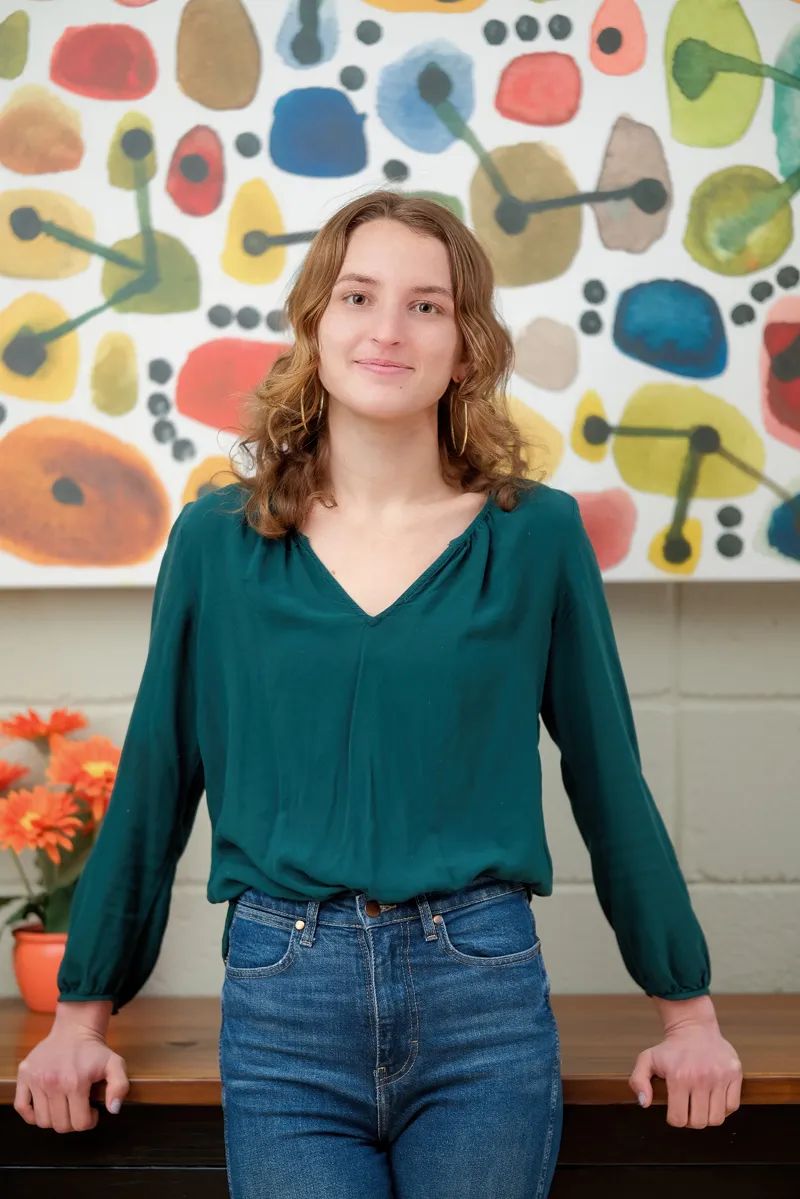
Ellie Stanton
Ellie, who comes “from a long line of survivors of domestic violence and sexual violence” and is passionately interested in the issue, says she began her new job by sending an email to every single person listed in a resource handbook published by the Billings Area Family Violence Task Force. There were at least 100 people, she says, and after two or three weeks of meeting with as many of them as possible, “the answer was yes, everybody wants all these services in one place.”
Ellie says she was warned at the outset that she would face obstacles based on turf wars between agencies, city-county differences, clashing egos, even red-blue divisions. But she operates on the “golden-nugget principle,” believing that everyone has a nugget of experience, resources or ideas that can move a project forward.
As it turned out, she says, everybody wanted was best for domestic violence survivors.
“We may have different opinions on how we support them,” she says, “but it seems like the Family Justice Center is the common answer for everyone.”
The process got another boost when the City Council allocated money that allowed the city to contract with the Family Justice Center Alliance, which came to Billings for a two-day site visit in June 2023, and then a two-day strategic planning conference last September. Leading that conference was Casey Gwinn, the former San Diego city attorney who opened the first FJC in 2002 and later co-founded and now heads the alliance.
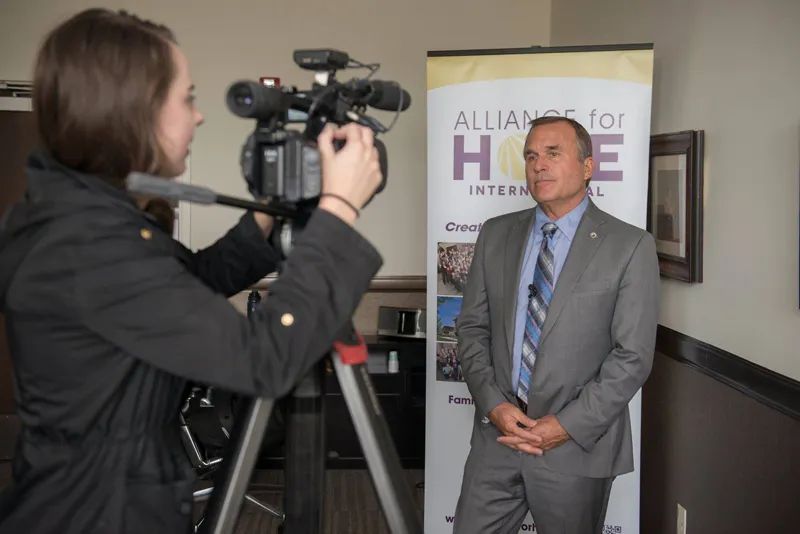
casey gwinn
Since then, the project has gathered steam so quickly that even the people involved in it are still a little amazed. Within the space of a few weeks in January, the decision was made to open a Family Justice Center in the old Gateway House shelter on the YWCA Billings campus on Wyoming Avenue, and to hire Taya Keith, herself a survivor of family violence, as the FJC coordinator.
Around the same time, a name was also chosen for the new facility. It will be known as Northern Lights: Family Justice Center. By late spring, as part of a “start-small” plan, a key handful of people hope to have the beginnings of Northern Lights up and running in the YWCA’s administration building while renovations begin on the old Gateway building.
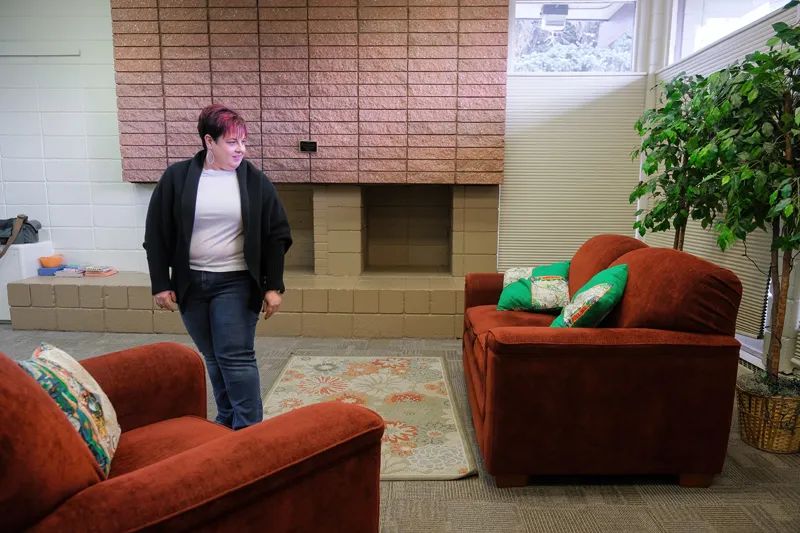
Erin Lambert, CEO of the YWCA, says that if all goes well, the center could be ready to move into the 10,000-square-foot Gateway building in about a year. Some agencies are already cooperating in the effort to help survivors of domestic abuse, Erin says, but a fully functioning FJC will be something else entirely.
“I’m thinking of what it means to bring other partners in that haven’t already been doing this work,” she says. “I think that has an opportunity to be a game changer.”
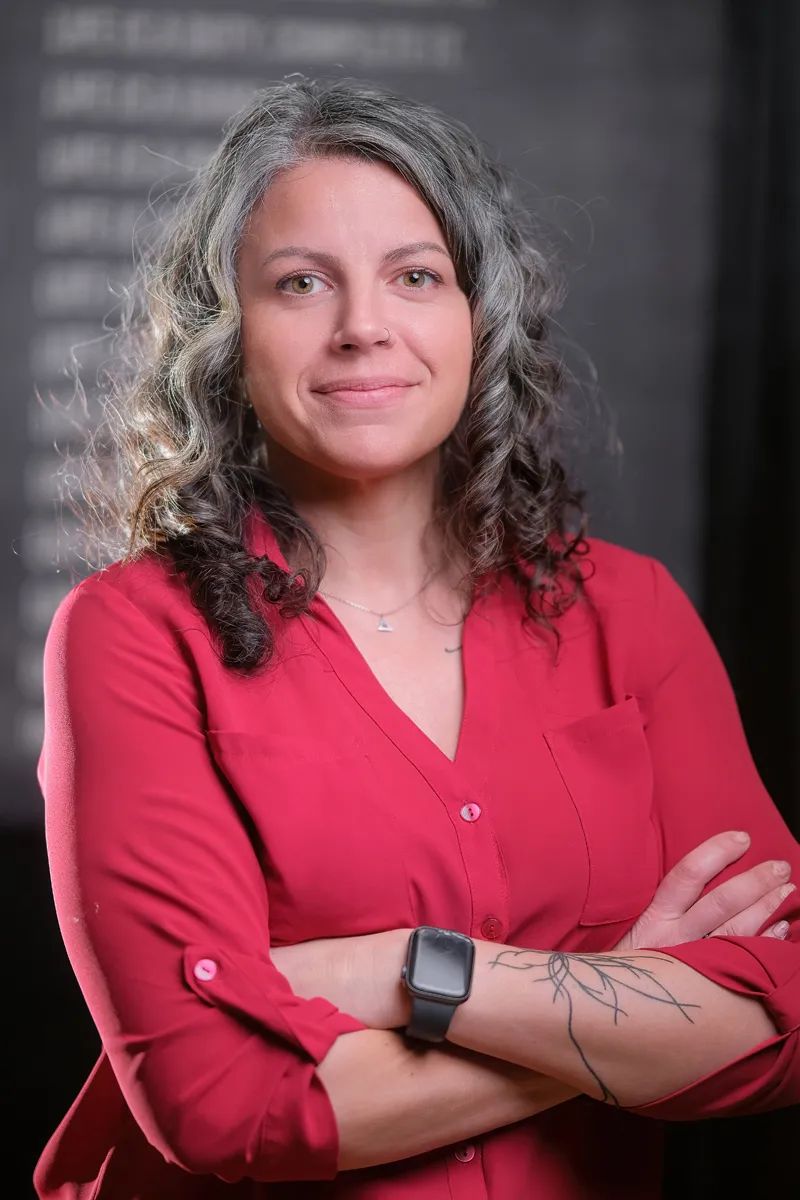
taya keith
That view is shared by Taya, the FJC coordinator. When she was subjected to domestic violence in 2016, the ordeal was made worse by the feeling that she was all alone. She’ll never forget going to the Yellowstone County Courthouse in hopes of obtaining a restraining order against her then-husband.
“I went to the courthouse and it was really, really sad,” she says. “I was given paperwork, and it was kind of a dark room and they said, ‘Here, fill out this packet.’ And I sat by myself, balling my eyes out, not knowing how or what or any of it. Just so alone and scared and sad.”
Taya was drawn into the Family Justice Center planning effort early in 2023, when Ellie called and, knowing what Taya had been through, asked her to be on a Voices Committee, a group of survivors who could bring their real-world experiences to the planning process. Taya, already committed to helping people survive abuse, didn’t hesitate.
“I’m at work, and I said, ‘Absolutely. Yep. Whatever I can do.’”
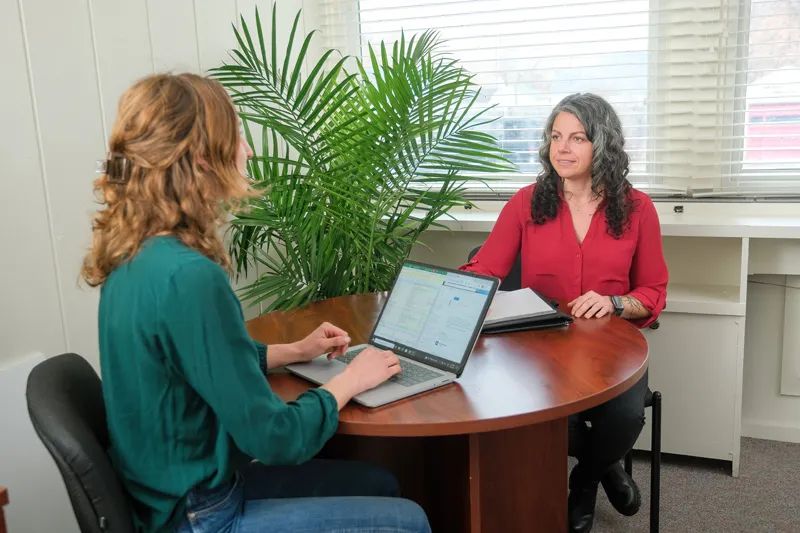
Taya became so involved in the process that Ellie, early this year, encouraged her to apply for the coordinator position. Taya had assumed the coordinator would be a part-time volunteer, but Ellie told her no, it would be a paid, full-time position. After some more discussion, Taya decided to go for it.
“I mean, I’m so passionate about it, I don’t know how I couldn’t,” Taya says, adding that she’s always believed that “as long as you’re passionate about something, you’ll figure the rest out.”
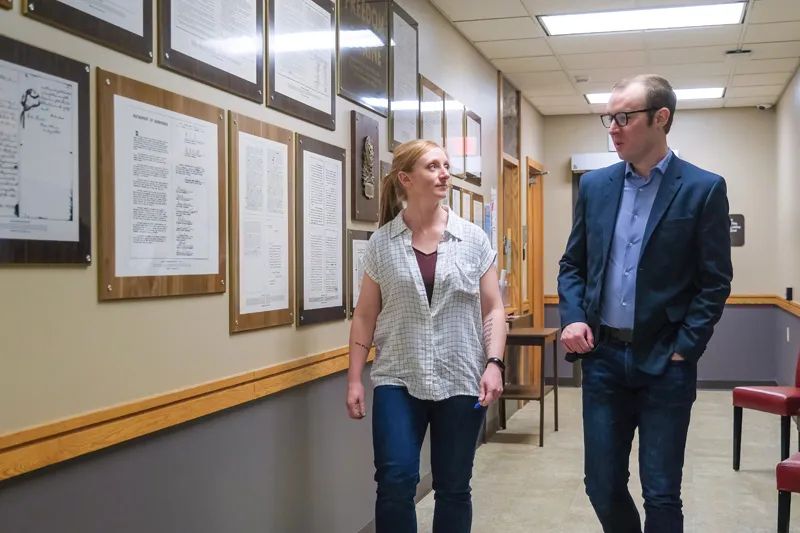
Ben Halverson will be among the first people working at Northern Lights. He has been a city prosecutor for 11 years and the city’s domestic violence prosecutor for nine of them. He was alone in that division until a couple of years ago, when two more prosecutors were hired. They work closely with three victim witness specialists who gather information and interact daily with survivors.
Ben has watched as domestic violence went from a steady stream to a flood. In 2015, the city attorney’s office handled about 600 DV cases. In 2020, the first year of the Covid pandemic, the number doubled. The number has since leveled off to just over 1,000 cases a year. And the city handles only misdemeanors. Felonies are dealt with by the county attorney’s office.
In his profession, Ben says, it is a given that most domestic abusers are going to re-offend. “It’s just a matter of when, and how severe it is,” he says. That’s why putting abusers in prison shouldn’t be the only goal.
“Convicting domestic abusers is not enough, right?” he says. “Because like I said, most of them are going to re-offend. It’s trying to get victims out of those relationships permanently. … It’s geared toward victims and their kids, so they can get out and not experience that same exact thing over and over again.”
What makes a Family Justice Center so crucial, Ben says, is that “so many victims have a negative experience with law enforcement, for whatever reason, whether it’s a real slight or perceived.” That makes them wary of working with police or prosecutors, even unwilling to report abuse.
Victims are also at or near the limit for what they can tolerate, he says, both in terms of stress and the difficulty of going back and forth between multiple agencies in search of help. You can keep asking survivors to do everything they can to improve their situation, Ben says, “but if it’s one thing too many, they’re going to completely withdraw from the process.”
As part of the “start small” plan, Ben says, he and the other members of his team will work on rotation at the new Northern Lights, as will Katie Nash and John Tate, the police officers assigned to the Domestic Violence Unit. Katie says a county clerk will probably be there as well, to help file for orders of protection and other documents.
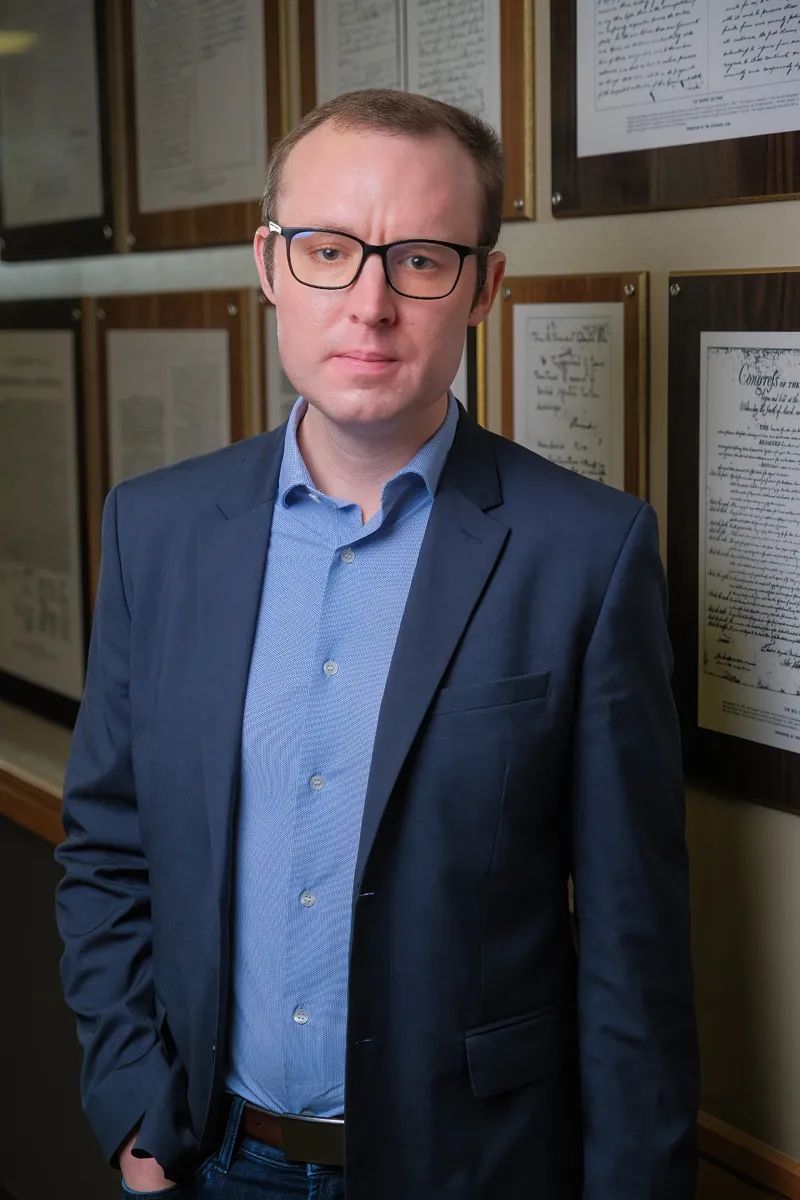
Ben Halverson
Other services will be added as the program slowly grows and then moves into the Gateway building. Other likely partners will be civil legal service providers, the Human Resources Development Council, child services and Native American specialists.
The City Council has already allocated $200,000 a year to run the center, plus $50,000 to help fund the coordinator position. County Attorney Scott Twito has pledged to look for funding through the county, and a funding sustainability working group will pursue grants and private donations.
Erin, with the YWCA, says the federal Office of Violence Against Women is another big potential funder. That agency could provide a city the size of Billings with $500,000 over four years to operate a Family Justice Center, she says. “It would certainly be a huge boost if we could tap into that funding,” she says.
The Gateway House, which offered dorm-style shelter with individual sleeping areas and shared bathrooms and a kitchen, was closed partly because Covid made shared spaces unsafe and partly because of changes in standards of care, Erin says. The YWCA’s new shelter, with 25 studio apartments, opened in April 2023. The number of people served there, expressed in terms of “shelter nights,” is on track to double this fiscal year, to around 16,000.
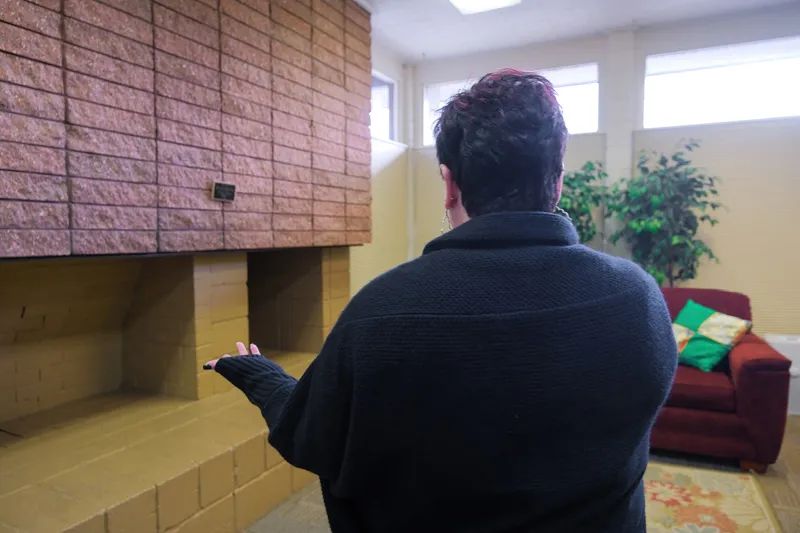
Erin says opening Northern Lights “is potentially going to open the floodgates of people who are seeking help, and the YWCA is already at capacity for those we can help.” That means the YWCA will have to undertake its own fundraising to provide enough shelter space and to hire more people.
One of the big hopes for all involved is that having a Family Justice Center, because of its size and the involvement of so many public entities, will greatly increase public awareness, and awareness among survivors of family violence.
“It needs to be something so big and bright,” Taya says. “I just want it to be beautiful, somewhere where someone feels so safe, and at home themselves, that even after they come in as a victim, they want to come back and volunteer and do whatever they can because they know the support is needed.”
Casey Gwinn, head of the Family Justice Center Alliance, says Billings will be the first Montana city to have an FJC, and Missoula has begun the process of starting one there. It’s never simple, he says, given that most agencies, so accustomed to working on their own, are reluctant to pool their resources.
“When it works, it’s magic,” he says. “It’s just hard to get people there.”
When he first proposed a Family Justice Center in 1990, as president of the San Diego Domestic Violence Council, Gwinn says, he was basically laughed at by prosecutors and law enforcement personnel. But then he ran successfully for city attorney by promising to push for such a center, which opened its doors in 2002.
It apparently was an idea whose time had come. Three months after the first FJC opened, Gwinn was invited to be on the “Oprah Winfrey Show,” and in 2003 he was invited to the White House when President George W. Bush proclaimed October as Domestic Violence Awareness Month. Bush also directed $20 million toward starting other FJCs, and named Gwinn to head the President’s Family Justice Center Initiative.
In a phone interview from San Diego, Gwinn said he was thrilled to hear that Billings was on the verge of opening a center, and that it would be headed by a survivor of family violence.
“I think that’s great,” he said. “It’s not terribly common, but when it does happen, I’m so supportive.”
Katie says she often repeats something that she heard from Gwinn and his associates, that a Family Justice center offers “a hallway full of practitioners,” rather than “a wall of brochures.”
“I think this will make the system a little less awful,” Katie says. “I don’t know that the criminal justice system will ever by victim-friendly, but at least they’ll find people who can say, ‘We’ll walk you through this. It won’t be fun, but we’ll walk you through to the other side.’ I hope it will be a big deal.”











